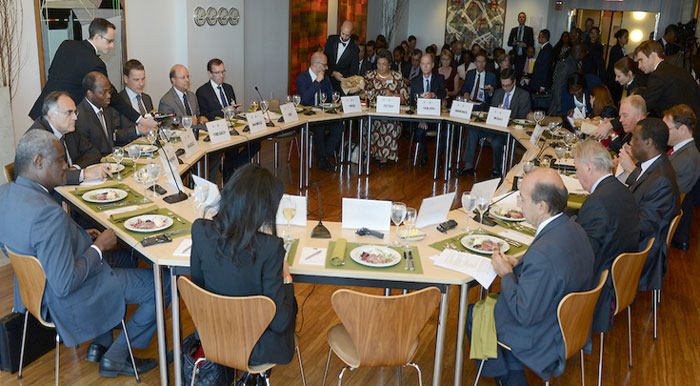
On September 23, 2013, a ministerial roundtable was held at IPI to discuss the role of civil society in facilitating peace and security in the Sahel region. One of the key insights discussed was that the countries of the Sahel, along with the international community’s support, have the primary responsibility to address the multifaceted challenges that led to the crisis in Mali and continue to weaken the region. Unless civil society is engaged, however, there will be no sustainable peace in the Sahel.
Held under the Chatham House rule of nonattribution, the roundtable brought together minsters and civil society groups from across Africa with officials from the African Union, the European Union, and the United Nations. The meeting, co-organized with the Government of Denmark, the African Union, and the Centre for Humanitarian Dialogue, produced six main points:
1. Partnering with civil society to advance good governance, ensure security, promote development, and provide humanitarian assistance is critical for building strong, accountable states and restoring the social contract. Stabilization and a sustainable restoration of peace by the involved governments can only be achieved through systematic, continued inclusion of all groups of civil society. This is the precondition for broad public support to peace agreements—and sustainable peace.
2. Northern Mali has been freed, and the country is stabilizing, but the crisis is not over. The Preliminary Agreement signed in Ouagadougou on June 18th this year, the successful presidential election, and plans to reform the Dialogue and Reconciliation Commission provide opportunities to broaden the dialogue between the Malian government and armed groups, and to engage with civil society (in particular, women, the youth, religious and traditional leaders, and academic and research institutions), as well as the media. This participation can contribute to the development of a comprehensive plan for a sustainable exit from the crisis.
3. Countries in the region need to create protected spaces that would allow civil society groups to function effectively and better define the appropriate partnership between them and elected leaders. A meaningful integration of civic education and other forms of training will help ensure a more informed engagement of civil society leaders.
4. In their efforts to expand and restore state authority across their territory, countries in the Sahel face a balancing act between decentralization and autonomy and between the urgency of securing their territories and the equally pressing necessity of providing basic social services to the population. Active participation of civil society can contribute to achieving the right balance.
5. Civil society actors that organize their activities around the republican principles of democracy, human rights, and good governance, rather than around identity or ideology, are much needed. Civil society groups committed to the principles of accountability and transparency are more likely to make meaningful and credible contributions across the region. The international community can help by providing civil society with adequate resources and improving their capacity.
6. To maintain focus over the long term, Mali should consider entering into a (New Deal) compact among the state, citizens, and international partners that would ensure all the energy and resources already mobilized remain channeled in the right direction.







